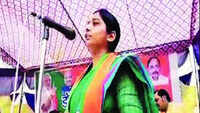Social views to making decisions, how kids are coaching parents
TNN | Apr 21, 2019, 07:33 IST
(By Jitender Dabas)
Have you ever been at the receiving end of a reprimand by your six-year-old, for doing something that, according to them, is not correct behaviour? Or subjected to sermons from your teenage kid about the unfairness of your conduct towards your domestic help, driver, or anyone else from the lower economic strata? Or been called out for not being environmentally conscious enough in your actions? If yes, then you belong to the growing tribe of parents being coached by their kids.
Last Diwali, some of my friends remarked they still harboured a desire to burn a cracker (or two) but did not do so for fear of being castigated by their kids. And last week, someone was told that, “We should not have a shower bath – bucket baths save water”.
Even schools are finding it more effective sending adults appeals for community-activity participation via kids, because that seems to ensure better compliance by grown-ups. From environmental consciousness and social equality to better civic sense, upper-middle-class parents today are coming under a lot of pressure – and from no-one else but their own kids. It seems that children are fast becoming our new moral science, environmental science and civics teachers (and that, too, rather strict ones).
But, has this always been true across generations, or is it unique to our times? Were our worldviews on society, community, environment different from our parents? And did we put it across to our mothers and fathers in the same way our kids are doing to us today?
Two things seem to be happening here. One, the benchmarks of the next generation on issues like equality, environmental consciousness and community seems to be a notch higher than ours. And, two, the parent-child power equation has been significantly altered especially in urban upper-middle-class homes.
The parents of today were kids in the days when opportunities were limited and resources scarce. And, by and large, one grew up trying to fend for oneself first before being charitable. But thanks to economic liberalisation, we are moving from a society driven by scarcity and frugality to one of choice and abundance. The narrative has moved from ‘me first’ to ‘we first’.
Meanwhile, privileged kids growing up in urban areas also get exposed to widening income and social disparity around them, which fuels their views about equality and social inclusion. For, according to research, children born to millennials care more about the community, environment and equality. We now have kids with first-world sensibilities growing up with parents whose upbringing was rooted in the third world.
Classical authoritative parenting is giving way to a more democratic and participative idea of parenting. With family sizes shrinking, and parents wanting to be friends and confidants first, traditional authority structures are becoming diluted. Our kids expect to be treated like adults, even at the age of eight – I don’t remember having as many democratic rights at dinner-table deliberations as today’s boys and girls. As a result, children are engaging with parents more as grown-ups with equal rights.
Technology has been the other disruption that has flattened authority structures, not just across social strata but also within middle-class households. The power of the wisdom of grown-ups, because they have more knowledge, doesn’t hold now because chances are your kid would search for it on Google faster than you. The disruption brought about by the internet and mobile phones in the last 10-15 years has left a generation of parents increasingly dependent on their sons and daughters for making decisions. Accordingly, this has enhanced the stature of kids at home.
This demolition of traditional wisdom and age-based authority structures is also manifesting itself in the workplace. Never before in history have so many organisations been headed by 30-somethings, or have there been younger people telling elders what to do. So, what’s wrong in being tutored by the younger ones, not just on tech but sometimes on moral sciences and social norms as well? In fact, in a society that is rapidly evolving, kids are often the harbinger of newer habits and model behaviours. The question is: Will we be open and willing students?
(The author is Chief Strategy Officer, McCann World Group)
Have you ever been at the receiving end of a reprimand by your six-year-old, for doing something that, according to them, is not correct behaviour? Or subjected to sermons from your teenage kid about the unfairness of your conduct towards your domestic help, driver, or anyone else from the lower economic strata? Or been called out for not being environmentally conscious enough in your actions? If yes, then you belong to the growing tribe of parents being coached by their kids.
Last Diwali, some of my friends remarked they still harboured a desire to burn a cracker (or two) but did not do so for fear of being castigated by their kids. And last week, someone was told that, “We should not have a shower bath – bucket baths save water”.
Even schools are finding it more effective sending adults appeals for community-activity participation via kids, because that seems to ensure better compliance by grown-ups. From environmental consciousness and social equality to better civic sense, upper-middle-class parents today are coming under a lot of pressure – and from no-one else but their own kids. It seems that children are fast becoming our new moral science, environmental science and civics teachers (and that, too, rather strict ones).
But, has this always been true across generations, or is it unique to our times? Were our worldviews on society, community, environment different from our parents? And did we put it across to our mothers and fathers in the same way our kids are doing to us today?
Two things seem to be happening here. One, the benchmarks of the next generation on issues like equality, environmental consciousness and community seems to be a notch higher than ours. And, two, the parent-child power equation has been significantly altered especially in urban upper-middle-class homes.
The parents of today were kids in the days when opportunities were limited and resources scarce. And, by and large, one grew up trying to fend for oneself first before being charitable. But thanks to economic liberalisation, we are moving from a society driven by scarcity and frugality to one of choice and abundance. The narrative has moved from ‘me first’ to ‘we first’.
Meanwhile, privileged kids growing up in urban areas also get exposed to widening income and social disparity around them, which fuels their views about equality and social inclusion. For, according to research, children born to millennials care more about the community, environment and equality. We now have kids with first-world sensibilities growing up with parents whose upbringing was rooted in the third world.
Classical authoritative parenting is giving way to a more democratic and participative idea of parenting. With family sizes shrinking, and parents wanting to be friends and confidants first, traditional authority structures are becoming diluted. Our kids expect to be treated like adults, even at the age of eight – I don’t remember having as many democratic rights at dinner-table deliberations as today’s boys and girls. As a result, children are engaging with parents more as grown-ups with equal rights.
Technology has been the other disruption that has flattened authority structures, not just across social strata but also within middle-class households. The power of the wisdom of grown-ups, because they have more knowledge, doesn’t hold now because chances are your kid would search for it on Google faster than you. The disruption brought about by the internet and mobile phones in the last 10-15 years has left a generation of parents increasingly dependent on their sons and daughters for making decisions. Accordingly, this has enhanced the stature of kids at home.
This demolition of traditional wisdom and age-based authority structures is also manifesting itself in the workplace. Never before in history have so many organisations been headed by 30-somethings, or have there been younger people telling elders what to do. So, what’s wrong in being tutored by the younger ones, not just on tech but sometimes on moral sciences and social norms as well? In fact, in a society that is rapidly evolving, kids are often the harbinger of newer habits and model behaviours. The question is: Will we be open and willing students?
(The author is Chief Strategy Officer, McCann World Group)
Making sense of 2019
#Electionswithtimes
View Full Coverage

































All Comments ()+^ Back to Top
Refrain from posting comments that are obscene, defamatory or inflammatory, and do not indulge in personal attacks, name calling or inciting hatred against any community. Help us delete comments that do not follow these guidelines by marking them offensive. Let's work together to keep the conversation civil.
HIDE